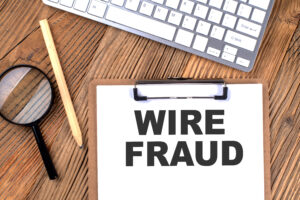Americans are falling victim to fraud, to the tune of billions of dollars each year. In particular, real estate wire fraud has proven an effective and sophisticated way for cyber criminals to steal large sums of money from those on the verge of purchasing a new property. Learn how to spot the red flags of real estate wire fraud and tips to protect yourself and your nest egg from thieves.
How real estate wire fraud occurs
Real estate transactions are rarely simple. And given the significant monies involved, you’ll want to ensure your investment is safe and secure. Often a real estate purchase brings together many service providers – realtors, mortgage brokers, inspectors, appraisers, title companies and real estate attorneys.
In working with several professionals amidst a purchase, it’s likely many of your conversations live in email. And according to a 2023 fraud summary from the FTC, email was the top reported tactic used by scammers to seek fraudulent payments. More formally known as “business email compromise,” BCE criminals send an email message that appears to come from one of your known real estate contacts making what appears to be a legitimate request. Perhaps most commonly, a message will come with instructions on how to wire your down payment, likely a sizeable fund.
How can you spot a real estate wire fraud email?

Signs of real estate wire fraud emails
Certainly cyber criminals can hack email accounts to send these message requests. Their emails are convincing and sophisticated, making it hard to detect any hint of criminality.
Look for these red flags:
- Check sender email domains for slight misspellings – if a hacker cannot get into the actual email of a real estate professional, they will create a similar account perhaps a character or two off, perhaps adding a “-” or extra initial, something that can easily be overlooked amidst a flurry of messages
- Look for grammar or spelling errors that seem off – similar to the email domain, check for typos or tone/wording that doesn’t align with your regular correspondence with the other person, as well as an irregular email signature
- Be skeptical of urgent messages pushing for immediate action – hackers will typically use urgency to pressure you initiating the wire to act without thinking; these tactics may include phrases like “you will lose the deal if…” or “you will be in breach of contract if you don’t…”
Especially amidst a long transaction and lots of email communication, It can be easy to overlook these warning signs of a scam email, but a potentially costly mistake.
Tips to protect yourself from real estate wire fraud
In addition to scrutinizing your emails to avoid fraud, some other ways you can be proactive against real estate wire fraud are:
- Never use unverified wires – always independently confirm wiring instructions in person or via a telephone call to a trusted and verified phone number; contact information from the email that includes the wire instructions should never be trusted. The hacker may include a phone number in the email that they created to induce you to call them so they can verify the routing and account information for the wire. Don’t click on any links or reply to the email or rely on a phone number included in the email.
- Install security/anti-phishing software and two-factor authentication – a hacker’s email and malicious links could be flagged by protective anti-phishing/security software; two-factor authentication is also a smart way to help ensure your email doesn’t get hacked. In general. keep your operating system and browser up to date as well.
- Report fraud – to prevent additional attempts (and perhaps help someone else), contact your bank, escrow officer, and the real estate service provider who was being impersonated by the cyber criminal. Wire fraud is a federal crime and punishable by fines and imprisonment.
FLB’s Real Estate, Land Use & Development team proudly represents individuals and businesses in hundreds of residential and commercial transactions each year. In addition, we also serve as licensed title agents for many real estate purchases, meaning we often help facilitate real estate wire transfers. According to a 2024 report, title and law firms are highly targeted due to the large sums of money involved in closing costs.
Please note: FLB will never send wire instructions in an unencrypted email. Just as we are invested in technology and security measures to help ensure our networks are safe, we are invested in educating our clients about real estate wire fraud to help protect them from cyber criminal activity.









